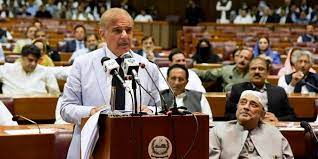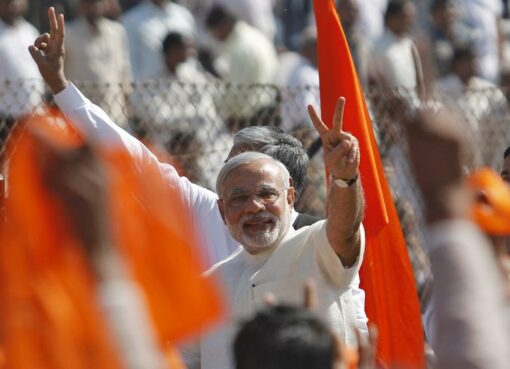Despite the odds in his favour, Trump can still destroy his chances himself if he mishandles the situation as he is quite capable of doing so.
by Prasad Nallapati
Impeachment proceedings against President Trump are in full swing as the Democrat-controlled House of Representatives likes to wrap up the investigation by end of this month. The Senate, dominated by Republicans, is set to take up the case soon after and conclude the trial by the Christmas. Divided on party lines, the Democrats are quite determined to pass the House impeachment bill as scheduled while the Senate is equally determined to dismiss it off.
Election scenario is also looking favourable to Trump as his popularity numbers continue to ride high and Democratic preliminaries are yet to throw up an effective challenger to him. Elders of the party and fund raisers are still looking for a prospective candidate, from outside the current Democratic lineup, that can defeat the incumbent President.
But it is too early and preposterous to declare the outcome of either the impeachment trial or the elections next year. Despite the odds in his favour, Trump can still destroy his chances himself if he mishandles the situation as he is quite capable of doing so.
Trump has lot of enemies inside the administration and a CIA whistleblower gave a bonanza to the Democrats in the form of an explosive text of telephone talk the President has had with his Ukrainian counterpart Volodymyr Zelensky requesting for a favour of re-investigating the son of former Vice President Joe Biden, a prospective Democratic candidate, in return for granting American aid to that country.
The House last week adopted procedures to open up the investigation to the public, which has so far been restrictive. Intelligence committee will now be holding open hearings, release transcripts of witness testimonies and issue a report. The Judiciary Committee will then prepare the articles of impeachment for voting by the full House. Trump and his counsel will be allowed to participate in the hearings of the Judiciary committee, but its Chairman can deny any of their requests.
Several former officials dealing with Ukraine have given their testimonies to the House committees, some of which seem to have some sensitive details of the President’s conversation. But most of them have had bumpy relations with Trump. These include Alexander Vindman, former Ukraine specialist in the National Security Council (NSC); Michael McKinley, former senior adviser to Secretary of State Mike Pompeo, Marie Yovanovitch, former ambassador to Ukraine, etc.
The House committee is calling more current and former officials this week to give testimony on the case, like Mick Mulvaney, acting Chief of Staff of the White House (WH), John Eisenberg, top lawyer in the NSC and his aide, Michael Duffey, WH budget official, Ulrich Brechbuhl, State Dept adviser and close to Secretary Pompeo, and John Bolton, former National Security Adviser.
But any subpoenas against them can run into legal problems as some of them are likely to invoke “executive privilege” to refuse giving testimony and only courts can resolve such disputes, which would delay the schedule. If the House decides to go ahead without their evidence, the whole exercise may prove futile as it may not be sufficient to convince the public. The evidence that has come out so far does not seem to be strong enough to force the impeachment of Trump from the Presidency.
Again, Democrats need to sway 20 Republican senators to vote to convict Trump and remove him from Presidency. Republican Senator Lindsey Graham exposed this vulnerability last week with a resolution – co-sponsored by 50 Republican senators out of 53 – condemning the House impeachment process. Even Republicans who do not like the president voted for this resolution.
Coming to election preparations, Joe Biden’s performance in the latest Democratic Presidential debate on October 15 was not quite reassuring. He clearly struggles with the fallout from his son’s dealings with the Ukrainian energy company and his beneficial deal with a Chinese financed private equity firm. Senator Elizabeth Warren, the current leader in several polls, faced an onslaught of questions about the financing of her many plans, especially her “Medicare for All” plan, which would provide government-paid healthcare to all. Senator Bernie Sanders, who recently suffered a heart attack, was his usual self on the stage, reassuring his supporters that he is still a viable and energetic candidate.
Both Warren and Sanders are the left-wing candidates and are considered by the party leadership to be too far on the political fringe to beat Trump. Biden has started a favourite with a 15% lead over his nearest candidate, but lost ground raising questions about his electability. He also proved to be a poor fundraiser with just about $9 million in his account. Sanders has close to $34 million and Warren $26 million last week.
Biden has large support among African Americans and senior citizens. Warren’s strength comes from educated people of the suburban areas while Sanders enjoys strong backing from universities. However, the problem is that these groups of voters have not shown any interest to transfer their vote to other democratic candidates making it difficult for any single democrat to get backing of the party majority.
According to a recent Moody’s modeling, which has only missed on one presidential election since 1980, found that Trump, who won by a 304-227 margin in the Electoral college in 2016, could easily surpass those results in 2020. The three different models showed Trump winning either 289, 332 or 351 votes in the Electoral College over his eventual opponent. The projections are based on how consumers feel about their financial situations, stock market gains achieved under Trump and the prospects for unemployment. Of the three models, Trump performs best under the “pocketbook” measure, which gauges how people feel about their finances, reports The Hill.
“If the economy a year from now is the same as it is today, or roughly so, then the power of incumbency is strong and Trump’s election odds are very good, particularly if Democrats aren’t enthusiastic and don’t get out to vote,” Mark Zandi, chief economist at Moody’s Analytics and co-author of the paper, told CNBC. The report shows that high turnout would favour the Democrats and projects a narrow Democratic victory if there is historic Democratic turnout.
(Prasad Nallapati is President of the Hyderabad-based think tank, the Centre for Asia-Africa Policy Research, and former Additional Secretary to Govt of India)




